I know Blake meant a lot to Bly. I have wanted for a long time to hear Bly talk about him.
I am listening to an Audible product I found a few nights ago titled “William Blake and Beyond”. It is a recording of a conversation between Robert Bly and Michael Toms.
Here is poem from this interview:
“In Jardin des Plantes, Paris”
Sein Blick ist vom Vorübergehn der Stäbe
so müd geworden, daß er nichts mehr hält.
Ihm ist, als ob es tausend Stäbe gäbe
und hinter tausend Stäben keine Welt.
Der weiche Gang geschmeidig starker Schritte,
der sich im allerkleinsten Kreise dreht,
ist wie ein Tanz von Kraft um eine Mitte,
in der betäubt ein großer Wille steht.
Nur manchmal schiebt der Vorhang der Pupille
sich lautlos auf –. Dann geht ein Bild hinein,
geht durch der Glieder angespannte Stille –
und hört im Herzen auf zu sein.
Bly recites an English translation of the poem at 26:45.
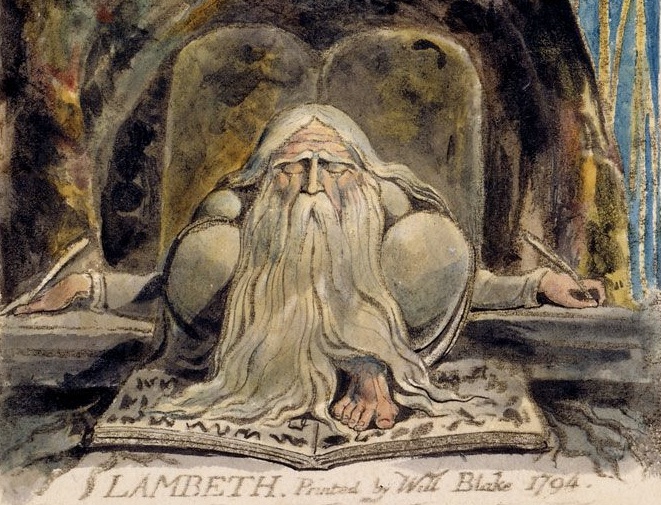
Urizen (“Your Reason”) writing laws with both hands
(How does that make you feel inside?)
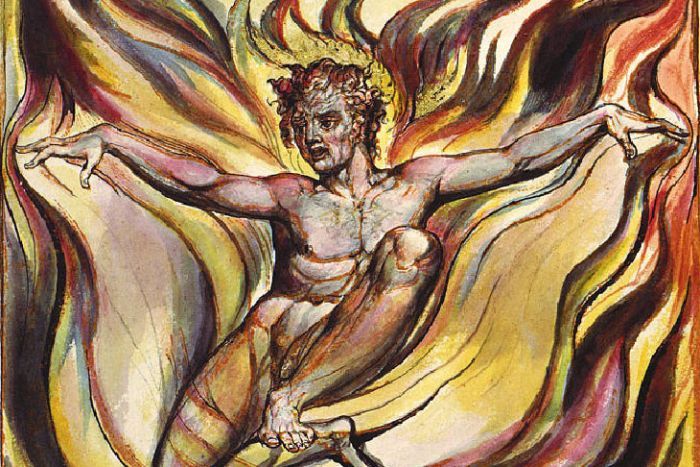
Orc
aaa about Orc
How many inner beings are inside of a person? Perhaps many.
The ancient world and polytheism. Ancient Greece had six males and six females in the Pantheon. That means that they named at least twelve interior beings. Apollo, Dionysius, Aphorodite, Zeus, Hera, Demeter. They were very aware of these beings. You can say that they are out there but you can also say that they are inside. Three to four thousand years of Greek labor went into that work of naming interior beings.
Then, Christianity came along and destroyed it completely. It absolutely wiped out two to three thousand years of this interior observation. I mean, fifty to sixty whole years GONE. It left the men with only one: Christ. And the women with only one: the Virgin Mary. (And of course, she has a much narrower range than even the most modest of the ancient goddesses, like Aphrodite.
Then, it could be said that nothing happened there for 1800 years. Christianity was determined that there was only one being inside. So, monotheism is connected with the idea that there is a center in the psyche. Bly says that he thinks this is the most dangerous implication of monotheism. And then, what happened—from one point of view—you get to Blake around 1800. He realizes that not only are the old twelve perhaps still alive inside, but there may be some that have grown up in the meantime when no one was watching. One of those that he decided on early was Urizen (which is a pun on “your reason”). And we know that in the French Revolution, they took down the statues of the Virgin Mary and replaced them with statues of reason—which would be a declaration that this had, in fact, happened. That a power had developed in the psyche which was extremely cold, extremely dedicated to human reason, tyrannical, blind. He called it “aged ignorance”. It deals completely with rules. He connected it to some extent with Moses coming down from the mountains. Blake said it was a disaster when he brought down the Ten Commandments. That was the beginning of this Urizen stuff.
Bly then mentions that “now” you can see it in Ronald Reagan and calls him a perfect example of Urizen. Says Reagan constantly wants rules and tends to promote corporeal war and diminish mental war. (What is the difference between corporeal war and mental war?) Corporeal war would be a war with Russia. (Remember that the recordings I am taking notes on is decades old. I do not know what year exactly this conversation took place but I suspect the 80s or 90s because Bly is talking about Reagan and also the Cold War. Also, there is a copyright on the Audible product saying “1984 New Dimensions Foundation”. Back to the notes.) An example of corporeal war, Bly says, would be a war with Russia. (I have to chime in again. What he says makes sense, especially at that time, but looking back forty years later because excepting the proxy wars, the war with Russia was a cold one. For those who do not know what the word corporeal means…I did when I was like two years old for real but maybe you do not yet,…here are a few definitions:
corporeal:
(1) of, relating to, or characteristic of the body. synonym: bodily.
(2) existing or manifesting in bodily form.
(3) of a material nature; tangible.)
Blake said their hirelings in the camp, the court, and the university, who would if they could forever depress mental war and prolong corporeal war.
I think this is the quote Bly is referencing. It is from Blake’s “Milton, a Poem (in 2 Books) To Justify the Ways of God to Men”:
“Rouze up O Young Men of the New Age! Set your foreheads against
the ignorant Hirelings! For we have Hirelings in the Camp, the Court, &
the University: who would if they could for ever depress Mental & prolong
Corporeal War. “
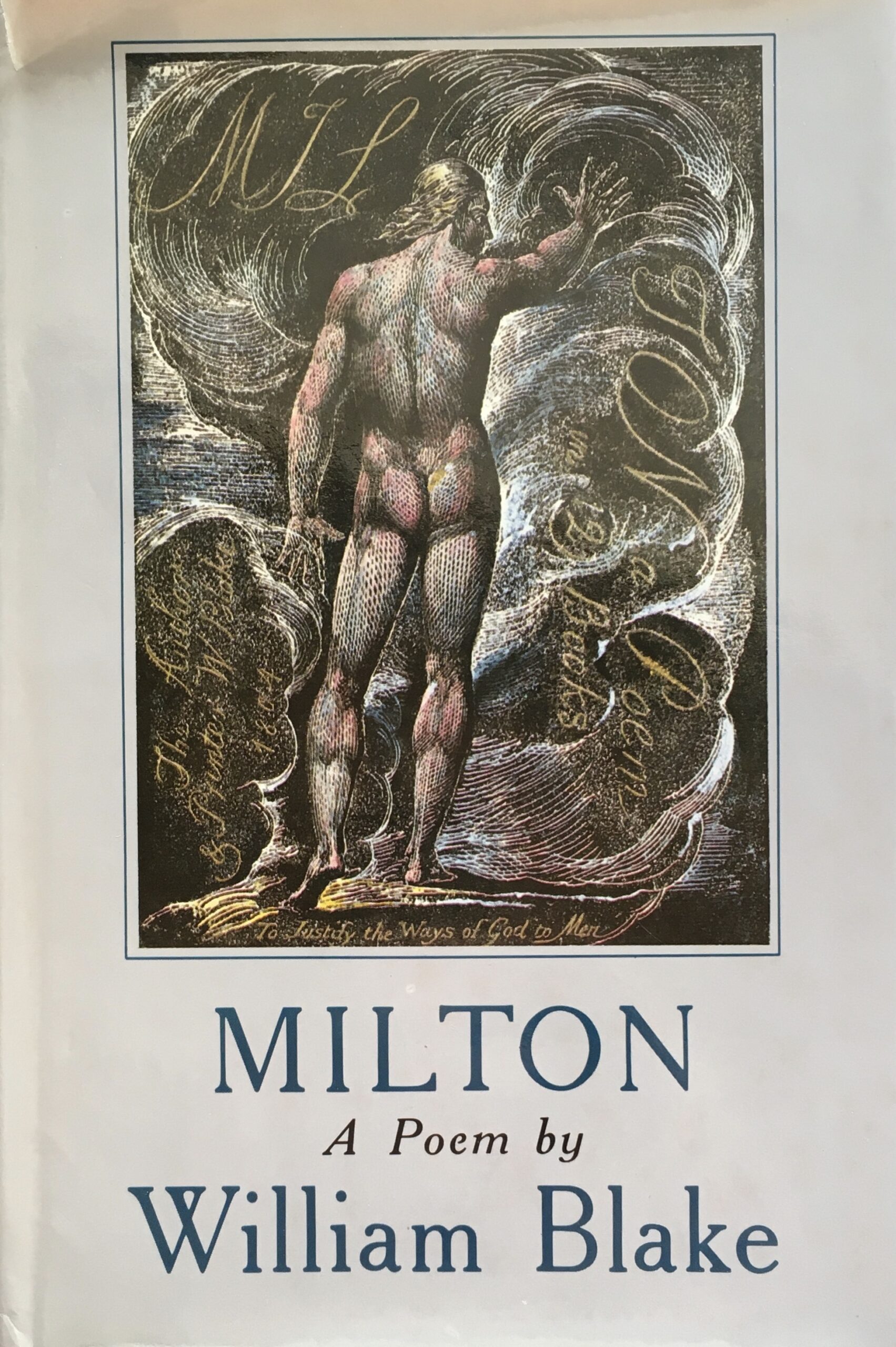
hireling:
(1) One who works solely for compensation, especially a person willing to perform for a fee tasks considered menial or offensive.
(2) One who is hired, or who serves for wages; esp., one whose motive and interest in serving another are wholly gainful; a mercenary.
(3) An employee who is hired, often to perform unpleasant tasks with little independence.”
So, they’re not interested in ideas, or a war of ideas. They love bodily war. (“More bodily war!”) Bly: “I’m not saying Reagan is an embodiment of Urizen. No one is, since it’s an energy inside the psyche. But we all participate in it. All our high school superintendents had a lot of that.” So then, Blake developed a second idea, which was of an energy called Orc. Orc is shown not as old and blind and surrounded by gravestones, as Urizen is. But Orc is shown as a younger man, sometimes in a crouching position, with fire all around the body. Orc represents a juvenile rebellion, a tremendous rebellious energy that comes with fire and wants to burn away everything.
When the French Revolution came, Blake felt that this Orc energy that had been slowly building up inside the psyche ever since the Christians had come to cleanse the world. That’s when he wrote his long poem “The French Revolution”. He expected that to come and cleanse everything, just as people in the early 1960s expected that that Orc energy, which was all over the United States in the 60s…it was in Janis Joplin, it was in the Beatles, it was in all of the rock musicians, it was in Ginsberg, it was very strong. (I think he is referencing the American poet and writer Allen Ginsberg). And then, Blake was very disappointed. What happened in the French Revolution? Well, it eventually turned on itself. From Blake’s point of view, Urizen is at 12 o’clock as a tyrant. Orc comes in, cleanses everything, and moves it around to the 6 o’clock position. Then, alas, continues and goes right back to the 12 o’clock position. So, to his horror, then, the Orc energy turned into the Urizen energy and they started killing their own people. At that point, he himself got a great shock and he realized that he was wrong in his belief that this adolescent, rebellious energy was a clean, pure, clear energy. On the contrary, he found out that it was allied in a strange way with the Urizen energy. In other words, that Mick Jagger is connected in a mysterious way with The Pentagon, which he doesn’t mention… which no one mentions… that there’s a mysterious interbalance between these two.
This was very depressing for Blake. And you know what happened, then? The 60s turned into the 70s. (Remember that these notes are mostly a direct quote of what Bly is saying in this talk. He goes on to say:) Out of all that work in the 60s, we produced Reagan. It isn’t as intense as the turnover in the French Revolution. And yet, to me (Bly), that’s a supreme and marvelous thing that he recognized that. That when the Orc energy is left alone, it will do two things: burn itself out, which is what happened to Janis Joplin and Jim Morrison. Both of them were amazing examples of Orc energy.
The first insight is that if people try to become Orc energy, they die. They simply burn up. And so, the second insight is that Orc cannot clean the world because it has a mysterious underlying relationship with the tyrannical thing—which is frightening idea. And somehow, we’ve all absorbed that in the last ten to fifteen years and it’s suppressed all the political people and we don’t know what to do.
What is he saying the people in that time had absorbed? He’s was talking about Reagan and the stodgy political attitudes during the Cold War, so I suppose he is saying that the people at that time had absorbed a lot of Urizen energy.
Exercise: Make a case that he is saying they had absorbed Urizen energy. Now make a case that it was Orc energy. You’ll have to have an understanding of this period in history (1980s) and also of Urizen and Orc.
Toms: So what you’re saying is, another thing Christianity had done prior to Blake was to say that the body and the soul were separate. And Blake saw that that was not true. That both were part and parcel of the same thing. And so essentially what you’re saying now is that this is all—and we’re all—wrapped up and intertwined. That even when we think we’re fighting against something, we may also be providing energy to to keep it alive.
Bly: That’s right. It’s very strange. And of course, the idea that the body and the soul are separate and distinct and are opposites would be a typical of Urizen, who would divide everything into categories. That’s a categorical reasoning, which later took effect in Newtonian science. Blake, all his life, was an enemy of Newton’s idea that the world was predictable and, therefore, dead. He called that “single vision” and he mentions Newton here. So, an amazing thing has happened, that not only has Blake’s thought about Orc and its dangers come so that we can see it in our own culture, but a second thing that has happened is that the subatomic physicists—following their experiences in Copenhagen—have come to the conclusion that when you get below the subatomic level, you cannot predict what a particle is going to do. Therefore, they have arrived, through science, at a state that also says the Newtonian worldview is wrong. Well, Blake would have been astounded to find this out. So, I don’t mean to say in any way that you can look at Blake and find subatomic physics. But that there is an alternative to the dead world. Blake saw it and the subatomic physicists see it.
I will now stop writing all that they are saying and just take some shorter notes because this process is driving me nuts. I feel like an asshole. I can feel my self-esteem slowly lowering minute by minute as I’m copying all this down. It started out helpful to me, but now I would be better off to write with a focus on concision (conciseness, brevity). If you’re still reading, you clearly enjoy all this, so just go listen to the talk! It is less than an hour long and is only $5.98. The link (underlined, in blue) is at the very bottom of this page.
Onto Blake’s character Los.
Blake developed the concept of The Four Zoas.
Zoa: old Greek word for “life”. Still used in Russia and in zoology.
The Four Zoas are the four living ones, the four living beings inside us.
Urizen: the corrupt judge, who wears black gloves, who can be bought off. He’s judging but he’s also corrupt.
Orc: a rebellious adolescent, attacker of tradition.
Those two can get a lot of energy going between themselves.
Los: the master of swift dissociation and joyful leaping. Blake also called this “poetic genius”. Think of Lorca, Shakespeare, jazz music. Not: law school.
The fourth, Tharmas: the female genetic foundation of all forms. Blake used the name Enitharmon early in his life.
Three males, one female. (They are only male and female in tone).
Think of the last two. Blake is saying that the artist cannot work in the third without going to the fourth, to the feminine root or foundation of all forms. The image is of the cornucopia out of which all forms come, the womb out of which all things come. When you have an obsessive patriarchy, they refuse to go to this fourth one, which is the refusal to take the female into the Trinity in the Christian Church. Blake has a Quaternity, not a Trinity.
aa
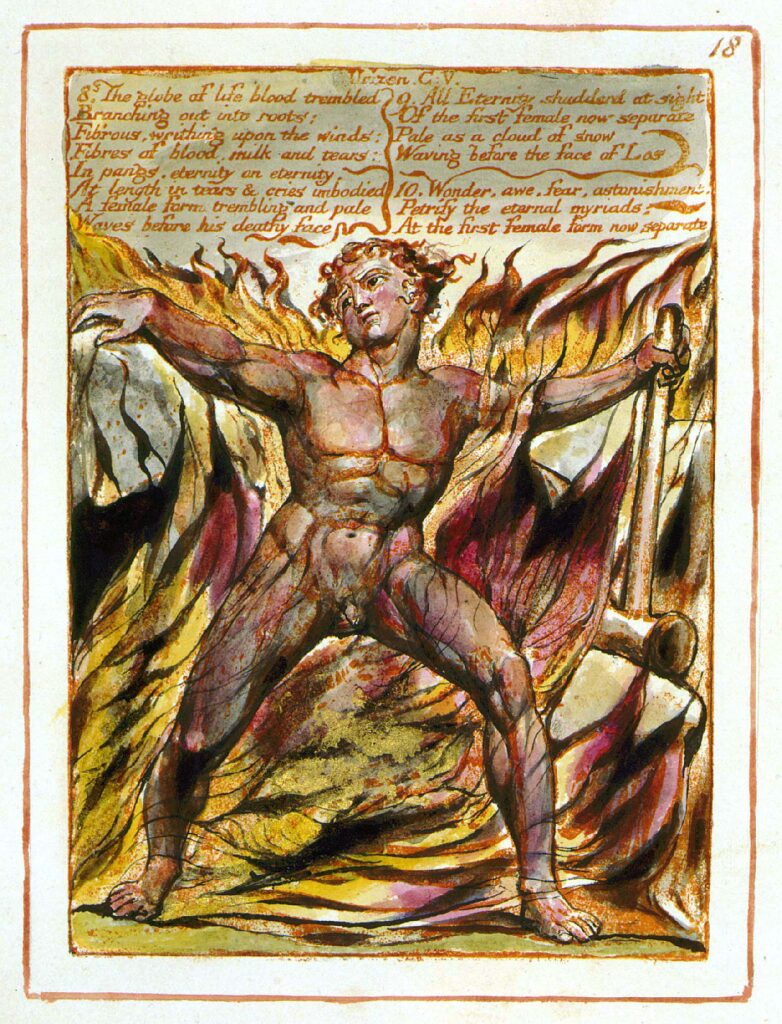
Los, as depicted in The Book of Urizen
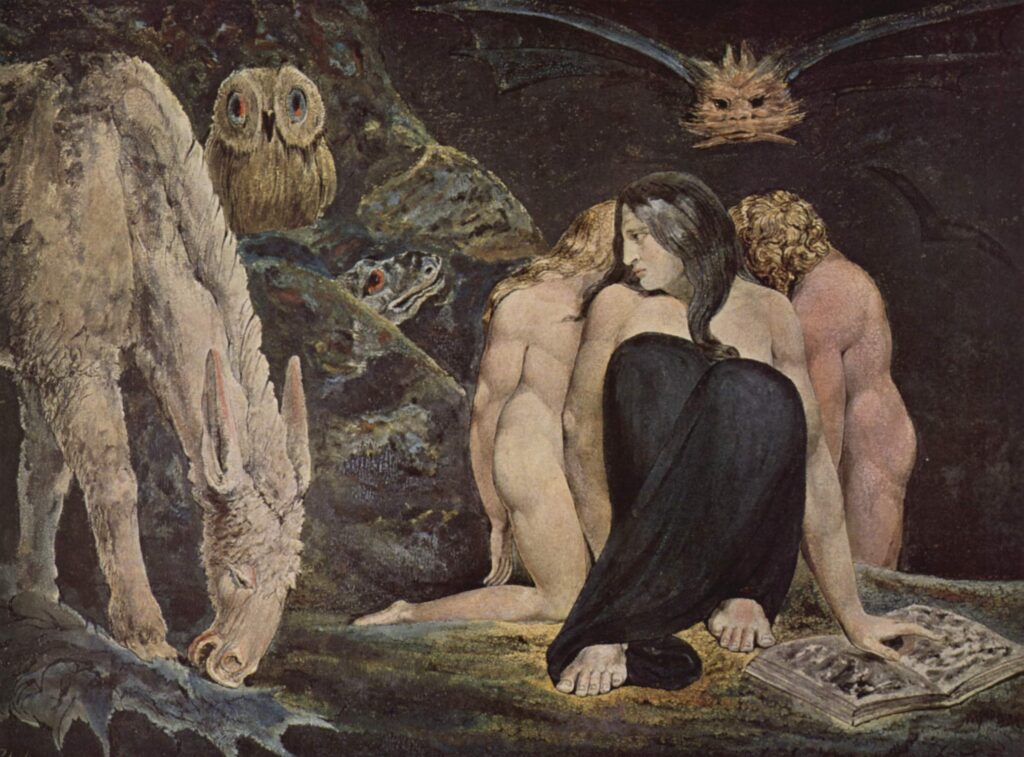
Enitharmon. A girl and a boy hide their heads behind her back.
The image, also created by Blake, is called The Night of Enitharmon’s Joy, often referred to as The Triple Hecate or simply Hecate
The Night of Enitharmon’s Joy depicts Enitharmon but is also Hecate, who is a chthonic Greco-Roman goddess of magic and the underworld. One interpretation of this work says:
She is triple, according to mythology: a girl and a boy hide their heads behind her back. Her left hand lies on a book of magic; her left foot is extended. She is attended by a thistle-eating ass, the mournful owl of false wisdom, the head of a crocodile (blood-thirsty hypocrisy), and a cat-headed bat.
Alright…wow…I directly quoted and paraphrased so much of that talk. Too much. I can’t keep doing this for talks. But this one is special to me at the moment that I’m making this post because I finally found a recording of Bly talking at length about Blake. I tried to get into Blake recently and was blown away by the bit of “Heaven and Hell” that I read. Then, the kids needed me and I put my Blake book down. A few busy weeks passed, then I found this talk, and now I’m sitting here writing this tedious post. (The content is not tedious in the slightest but the process of tabbing over to the Audible recording, hitting play, listening for six seconds, hitting pause, tabbing back to this post, typing what was said, tabbing back over to the Audible recording, hitting play, listening for six seconds, hitting pause, tabbing back to this post, typing what was said, tabbing back over to the Audible recording, hitting play, listening for six seconds, hitting pause, tabbing back to this post, typing what was said, tabbing back over to the Audible recording, hitting play, listening for six seconds, hitting pause, tabbing back to this post, typing what was said, tabbing back over to the Audible recording, hitting play, listening for six seconds, hitting pause, tabbing back to this post, typing what was said, …
it’s way too much. I’ll stop all of this within a few posts if I try to be this much of a dildo with it all.
I think I’ll make more posts discussing other recordings from Audible and Youtube but I will likely make the notes much shorter because I have at least one hundred hours of incredible recordings that I want to take notes on and doing as much direct quotation as I did here—for that much material—is not practical.
Rather, my notes may be extensive but not the direct quotations and paraphrases.
Here is the talk on Audible:
William Blake and Beyond
Add to the post about William Blake and bly and the four zoas:
The little Blake poem from the beginning of that audible product about protecting me from single vision and Newton sleep
Add also Blakes picture of Newton under the sea
Leave a Reply